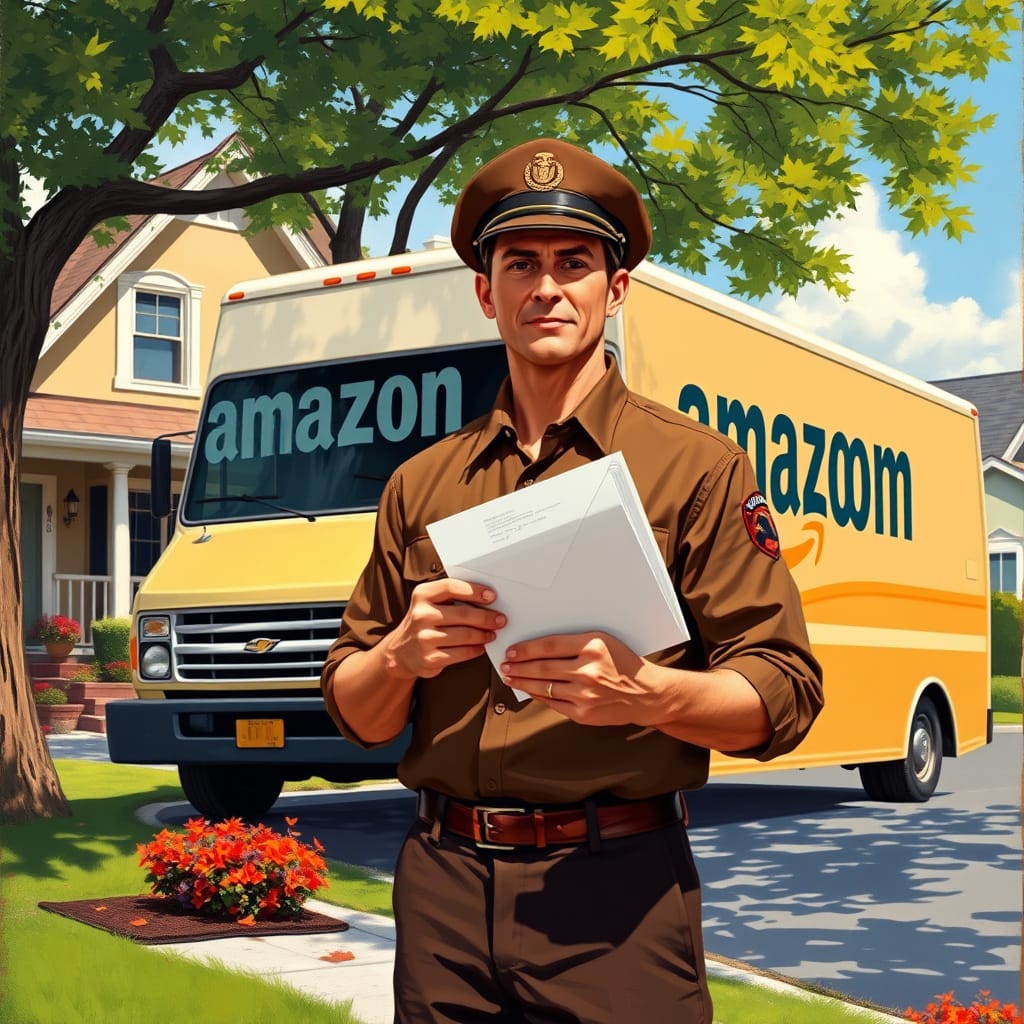Mr. Jassy,
Congratulations on your ongoing tenure as Chief Executive Officer of what we still affectionately call “Earth’s Most Customer-Centric Company,” though we both know it’s more accurately “Earth’s Most Data-Hoarding, Margin-Squeezing Behemoth.” As Jeff Bezos continues his expensive midlife crisis – launching himself into space like a billionaire’s version of a convertible Corvette – you’ve inherited quite the technological conglomerate at quite the interesting time.
I write this public letter not as criticism, but as a friendly warning from someone who’s observed Amazon’s trajectory since it was merely “Earth’s Biggest Bookstore.” Because, Andy, I’m not sure you fully grasp the perfect storm brewing on your doorstep.
The AI Shopping Apocalypse: When Algorithms Become Better Capitalists Than You
Your introduction of “Buy For Me” might be the most stunning self-sabotage since Netflix decided splitting their DVD and streaming services was a brilliant idea.1 For decades, Amazon built an impenetrable fortress designed to keep customers trapped within your ecosystem. Prime memberships, fulfillment services, proprietary payment systems – all meticulously engineered to ensure transactions flow through Amazon, generating both fees and that precious, precious data.
But now you’re permitting AI agents to purchase directly from brand websites. What’s next, Andy? Sending customers Walmart gift cards on their birthdays?
Here’s the existential threat you’re not discussing in earnings calls: human shoppers are gloriously, wonderfully irrational. They’re emotional. They click “Buy Now” because they had a bad day. They add items to their cart because the orange “Only 3 left!” banner triggered their primal fear of scarcity. Your entire business model depends on this beautiful irrationality.
But AI shopping assistants? They’re merciless, emotionless negotiators who won’t be swayed by that lightning deal countdown timer.2 They won’t make impulse purchases in the checkout line. They’ll ruthlessly compare prices across every platform, every time, without fail. And they’ll certainly never develop a parasocial relationship with your “personalized” recommendations.
As consumers increasingly delegate purchasing decisions to AI agents that “simplify purchases and decision-making processes”, you’re essentially replacing impulsive humans with rational algorithms.3 That’s like a casino replacing gambling addicts with mathematicians.
“The Cloud” – Or How I Learned to Stop Worrying and Love Someone Else’s Overpriced Computer
Let’s discuss AWS, shall we? Your profitable cloud safety net that subsidizes everything else. Yes, AWS still commands an impressive 30% of global cloud infrastructure market share in 2025.4 Congratulations! That’s like being the most successful horse-drawn carriage manufacturer in 1910.
The dirty secret of cloud computing – which even your own customers are starting to whisper – is that it’s just someone else’s computer, but more expensive. As AI consumes more compute resources, the paradox is that basic computing infrastructure is becoming commoditized. Your startups and SMBs (who now make up 28% year-over-year growth of your customer base) will eventually do the math and realize they’re paying a premium for what they could do themselves.
Bold Prediction From A Future Where AWS Stands For “Actually, We’re Struggling”: The great cloud computing exodus has already begun. It’s slow, like the first raindrops before a hurricane, but it’s happening. On-premises infrastructure is making a comeback, just with better automation and minus the maintenance headaches. Your 92% of customers spending less than $1,000 monthly? They’ll be the first to leave.
Tariff-ic News: When Even Stacked Inventory Can’t Save You
I particularly enjoyed your recent earnings call where you assured investors that your third-party sellers are “advancing the number of… so they inventory here well”.5 Translated from CEO-speak: “We’re telling everyone to bulk order before tariffs hit harder.”
A 145% tariff on Chinese imports isn’t a speed bump, Andy – it’s a brick wall at the end of a highway. Your temporary solution of stockpiling inventory might buy you six months at most. As analyst Gil Luria aptly observed, you can’t have “stocked more than six months worth of inventory”.
What happens when that inventory depletes? Allow me to paint the grim picture: You’ll need to allow price increases (angering customers), accept lower margins (angering shareholders), or force merchants to accept lower margins (angering the very sellers who make your marketplace valuable). It’s a corporate version of “Pick Your Poison,” except all options lead to the same unpleasant outcome.
The Secret Sauce That Made Amazon… That Nobody Talks About
Let’s discuss something that isn’t in your shareholder letters – the forgotten architect of Amazon’s early success. While everyone credits Jeff’s vision, few remember that Jeff Bezos personally hired a man named Eric Ward to run Amazon’s first link outreach campaign – what people call Amazon Associates, is what SEO’s call backlink outreach campaign on steroids.6
This man – who was affectionately and appropriately known as “LinkMoses” in SEO industry circles – built Amazon’s digital infrastructure before digital infrastructure was even a concept. His link-building campaigns regularly achieved 90% success rates in outreach attempts, driving millions of new customers to Amazon when you needed them most.
The great irony is that the internet ecosystem Eric Ward built for Amazon – getting “every blogger and their grandmother to recommend your products” – is precisely what AI shopping assistants will render obsolete. When algorithms make purchasing decisions, all those carefully cultivated product reviews and affiliate links become digital relics.
Bold Prediction From A Digital Archeologist: The future of e-commerce won’t be won through SEO or backlinks or customer reviews. It will be determined by which company writes the most persuasive API documentation for AI shopping assistants.
The Revenge of the Merchants
Remember how Amazon built its empire? By collecting vast amounts of customer and product data while sharing almost none of it with the merchants who actually stock your digital shelves. Those merchants have been forced to pay increasingly steep fees for the privilege of being data-mined and margin-squeezed.
Now, with AI shopping assistants, those same merchants might finally get their revenge. When customers delegate purchases to AI, and those AI agents can shop anywhere, what’s to stop a merchant from creating direct relationships with these AI systems, bypassing Amazon entirely?
As your own “Buy For Me” feature demonstrates, even Amazon recognizes that the walled garden approach has an expiration date. The moment AI shopping assistants become sophisticated enough to handle complex purchasing decisions, the balance of power shifts dramatically away from platforms and toward direct brand relationships.
In Conclusion: The Future Is Here, It’s Just Unevenly Distributed (And Mostly Not In Your Favor)
Andy, I don’t envy your position. You’re steering a supertanker through increasingly treacherous waters. AI shopping assistants are eroding the behavioral economics that drive impulse purchases. Cloud computing is becoming commoditized. Tariffs are forcing impossible choices. Chinese e-commerce competitors like Temu are perfecting their English and their marketing.
The moat that Eric Ward helped build for Amazon – the one that transformed you from a prison filled with books to the promised land of e-commerce – is evaporating in the heat of technological change.7 The backlinks that once directed humans to your products will soon be replaced by the APIs and protocols (MCP anyone?) that direct AI agents to the best deals, regardless of platform.
My unsolicited advice? Embrace the chaos. If AI is going to disintermediate everything anyway, be the disintermediator-in-chief. Make Amazon the platform that AI shopping assistants prefer to work with, not because you’ve trapped them, but because you’ve made it advantageous for them.
Or don’t. What do I know? I’m just a columnist who shops at Amazon because it’s marginally more convenient than the alternatives. For now.
Watching with morbid fascination,
Simba, founder of TechOnion.
P.S. If we’re wrong about any of this, please let us know in the comments below. After all, even AI shopping assistants need a good laugh sometimes.
Enjoyed this article? Support independent tech satire! [TechOnion] runs on your donations and the tears of disrupted industry executives. For the price of a Prime membership, you can help us continue peeling back the layers of technological absurdity. Unlike Amazon, we don't have a secret pricing algorithm – give whatever you want, even if it's just thoughts and prayers (though we prefer actual currency).

References
- https://www.forbes.com/sites/kirimasters/2025/04/08/amazon-buy-for-me-is-the-latest-entrant-in-the-ai-shopping-agent-race/ ↩︎
- https://www.linkedin.com/pulse/consumer-behavior-2025-navigating-age-ai-assisted-shopping-khater-zjbsf ↩︎
- https://www.novalnet.com/blog/ai-takes-over-shopping-but-at-what-cost/ ↩︎
- https://hginsights.com/blog/aws-market-report-buyer-landscape ↩︎
- https://www.reuters.com/business/retail-consumer/amazon-sellers-are-stocking-up-face-tariffs-its-short-term-fix-2025-05-02/ ↩︎
- https://www.seo-theory.com/remembering-linkmoses/ ↩︎
- https://moz.com/blog/tribute-to-eric-ward ↩︎





GIPHY App Key not set. Please check settings